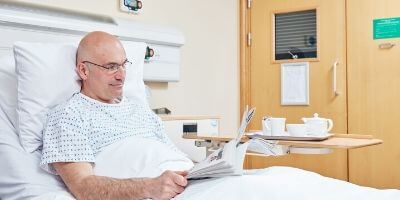Haemorrhoidectomy

A haemorrhoidectomy is a surgical procedure to remove haemorrhoids.
Consultants who perform this procedure
Special interests include:
{{ consultant.special_interests[0].name }} (+ {{ consultant.special_interests.length - 1 }} more)
Learn more about haemorrhoidectomies at King Edward VII’s Hospital
Why would I need a haemorrhoidectomy?
Most patients requiring this operation do so because other treatments including ointments, suppositories and procedures to shrink enlarged haemorrhoids (such as injection sclerotherapy or rubber band ligation) haven’t worked.
What symptoms does haemorrhoidectomy surgery address?
A haemorrhoidectomy helps to relieve the pain, discomfort, bleeding, itching and discharge caused by haemorrhoids. It can also help to manage strangulated haemorrhoids.
When should you speak to your specialist about a haemorrhoidectomy?
If you have painful, uncomfortable haemorrhoids that are causing you distress, speak to your specialist who will be able to assess you for treatment and who will talk you through your treatment options.
How is a haemorrhoidectomy operation performed?
A haemorrhoidectomy is carried out under general anaesthetic and takes around 45 minutes. You may need an overnight stay in hospital after your surgery.
A haemorrhoidectomy involves your surgeon gently opening your anus with a retractor to visualise the haemorrhoids. A diathermy medical device is then used to cut off the haemorrhoidal tissue and any associated anal skin tag. Sometimes a dissolvable suture is placed around the upper part of the haemorrhoid, inside the back passage, to stop the blood flow. Any remaining small areas of bleeding are then cauterised (cut off the blood flow from tiny vessels) with the diathermy. Usually, a cylinder-shaped sponge-like dressing (called a Spongostan) is placed into the back passage at the end of the procedure. Most surgeons inject local anaesthetic to the area during or after the procedure.
What is the recovery like for haemorrhoidectomy surgery?
Your recovery from haemorrhoidectomy surgery will depend on multiple factors, including your age, fitness level and the nature of your procedure.
When you wake up, you may feel some pain in your back passage but your medical team will provide you with pain relief medication. Sometimes, a short course of antibiotics and medication to relax the circular muscle of the anus (anal sphincter) is prescribed. The dressing inside your back passage may feel uncomfortable and like you need to open your bowels.
The dressing will remain in place until you next pass a stool. It can be safely flushed down the toilet.
Haemorrhoidectomy surgery is painful – expect severe pain for the first two postoperative days, significant pain for the first week and less severe pain in the second week.
You will also be advised to eat a high fibre diet and to stay well hydrated so that you don’t have to strain to go to the toilet. You may be given laxatives to ease the strain. There may be some bleeding when you open your bowels for the first few times.
You can expect to take up to two weeks off work, depending on your job and you should get back to your usual activities gradually and at your own pace.
Are there any risks/complications associated with haemorrhoidectomy surgery?
As with any medical procedure, it’s possible for risks or complications to arise. Speaking with your specialist or surgeon beforehand will help you avoid any adverse reactions.
Haemorrhoidectomy has a relatively low risk of serious complications, but the following risks and complications can occur in a small number of cases:
- Excessive bleeding
- An infection in the back passage
Bleeding up to an egg cupful each time you open your bowels in the first two weeks after the operation is normal. If you experience bleeding of more than a cupful (200 ml) in 24 hours, you should seek urgent medical attention.
How can I prepare for a haemorrhoidectomy?
Prior to a haemorrhoidectomy, your surgeon will discuss with you how best to prepare for the operation, as each patient is different.
Common preparations for haemorrhoidectomy include:
- Routine blood tests, x rays or scans as requested by your surgeon
- Taking steps to stop smoking if you smoke
- Losing weight if you’re overweight
- Remaining active and doing regular exercise
Are there alternatives for a haemorrhoidectomy?
There are various treatments available for haemorrhoids, depending on their size, position within the anal canal and severity. These include rubber band ligation, the Rafaelo (Radio Frequency Ablation of Haemorrhoids under Local Anaesthetic) procedure, the THD (Transanal Haemorrhoidal Dearterialization) procedure and the HAL (Haemorrhoidal Artery Ligation) operation. Your doctor will discuss your individual case with you, but if your haemorrhoids are very large or mostly external (outside the anal canal), then haemorrhoidectomy may be your only option.

Guide prices may vary following consultation. We also work with all major insurance companies.
0% interest payment plans available
For a full list of what is and isn’t included, visit self paying for treatment
{{ currentPackage.length_of_stay }}
Call 020 7467 4344
Make an enquiry


